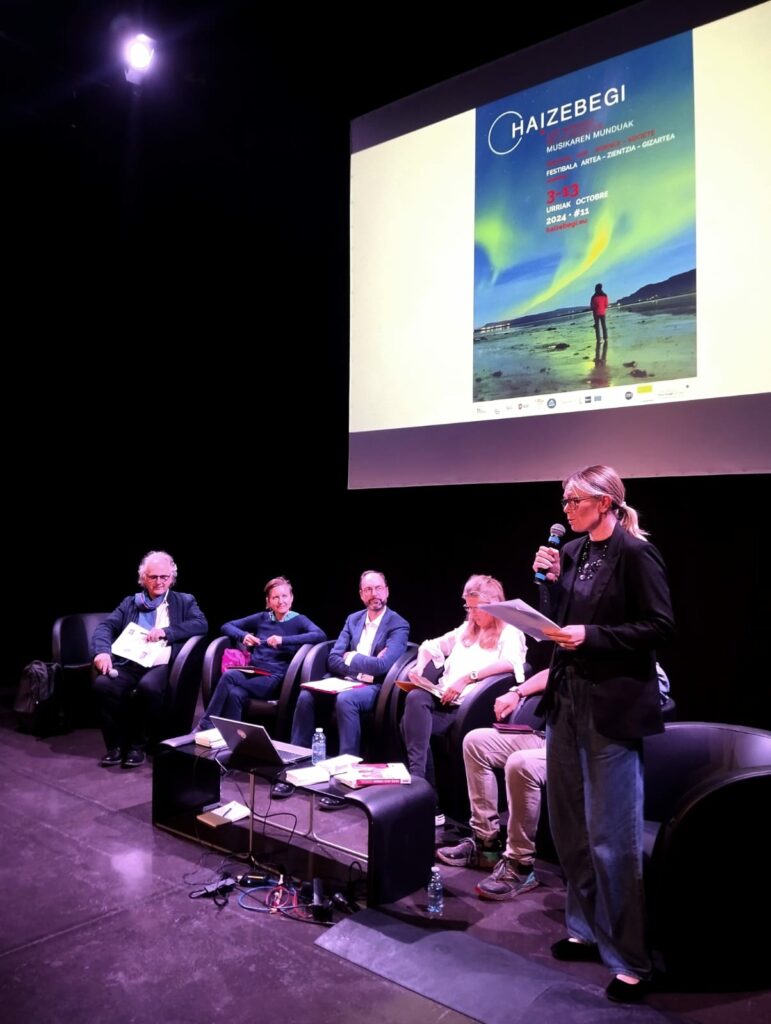On Saturday, October 5, the Haizebegi Festival took place in Bayonne. This edition was marked by a special day dedicated to celebrating the 160th anniversary of the French Red Cross. The event brought together key witnesses and experts to shed light on the relationship between music and the principles of International Humanitarian Law (IHL), emphasizing music as a tool for resilience and peace in times of conflict.
A day filled with reflections and emotions
The invited speakers, who shared their personal experiences, highlighted the deep connection between music and IHL principles. Omar Ibrahim, a Syrian artist and professor at ESAPB, spoke about art as a means of restoring faith in humanity. « Since 2011 and the revolution in Syria, art is no longer just entertainment; today, my artistic work has become a way to create reasons for life in the face of the many causes of death that surround us. », Rana Kharouf, an international law expert and legal advisor for the UNHCR and the ICRC, emphasized the importance of creating and sharing “beauty” in the midst of conflict: « The beauty found in music can give life in the face of death. » Reflecting on her experiences in Damascus, Rana highlighted the efforts of many young people who continued to engage in theater and music despite the bombings. Additionally, Émilie Rammaert, a cellist and president of the French Red Cross Commission, shared her passion for both music and peace. « I hope that music will drown out the macabre noise of weapons ». She described music as a powerful means of transcending the suffering of war and spotlighted several projects she has been involved with in Vietnam, Panama, and most recently, Ukraine.

Refugee reception and integration challenges
During the panel of key witnesses, François Héran, founder of the Convergences Migrations Institute and professor at the Collège de France, reflected on the reception of refugees in France and the unequal distribution of those granted refugee status across Europe. He debunked common misconceptions about asylum in France and compared the country’s capacity to welcome refugees with countries like Germany and Turkey. Héran stressed the need to uphold fundamental rights in the face of growing threats to democratic freedoms.
Music as a factor of resilience
Other speakers, taking a more scientific approach, such as Frédéric Ramel, professor of political science and researcher at Sciences Po Paris, discussed music’s dual role, noting that while it can be used as a tool of torture (as seen in detention centers like Guantanamo), it can also foster social bonds and hope. Caroline Brandao, head of the IHL department at the French Red Cross, referenced French artists like Nougaro and Moustaki, who spread messages of peace in response to the wars of their time and the threat of nuclear weapons. (For more on this : The soundtrack of International Humanitarian Law).
Marta Amico, a lecturer in ethnomusicology, contextualized music as an act of identity-based resistance and integration, citing the example of displaced Tuareg musicians in Bamako. Frédéric Joli, former spokesperson for the ICRC, concluded the series of talks by reminding the audience that music conveys messages of IHL and calls out violations in conflict zones. Despite its various battlefield functions, music possesses a unique ability to unite and elevate cultures through mutual understanding.
Philosophical reflections and an exceptional concert
The day ended with a philosophical lecture by Francis Wolff, who invited the audience to reflect on the meaning of life. Through a masterful demonstration, the philosopher showed that despite humanity’s destructive tendencies, a sense of humanity endures, rooted in communication and shared values of collective well-being. He concluded : “Life has no inherent meaning, it’s even absurd, but it is up to each of us to give it meaning. I believe that some of us, perhaps all present here, have already found that meaning.“.
The festival concluded with an exceptional concert featuring two of the world’s greatest clarinetists, David Krakauer and Kinan Azmeh, who took the audience on an unforgettable musical journey through Syria.
This event was much more than a simple festival; it reminded all in attendance that even in the darkest hours, it is possible to unite people and rekindle hope for a future of peace.





